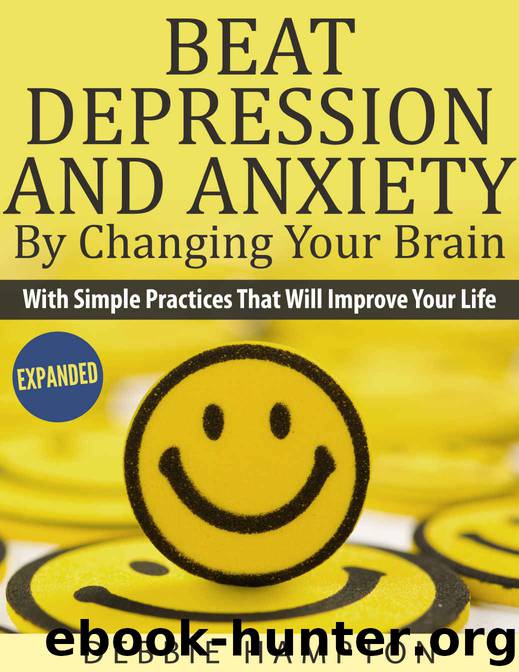Beat Depression And Anxiety By Changing Your Brain by Debbie Hampton

Author:Debbie Hampton [Hampton, Debbie]
Language: eng
Format: epub
Published: 2015-02-28T18:30:00+00:00
Chapter Seventeen
The Law Of Little Things
Enjoy the little things in life, for someday you will realize they were the big things.
Kurt Vonnegut
Some mental discomfort is inevitable in our lives because we evolved into feeling beings emotionally invested in others, and we experience distress when we think we or they are harmed, rejected, or hurt in some way. Running late for an important appointment, a weird look from your partner, or a worried thought about the credit card balance can be interpreted as a threat by your brain which sounds the alarm and causes your body to react accordingly.
Epinephrine gets your heart revved up so you can move fast. Norepinephrine sends blood to your large muscle groups and the bronchioles of your lungs while your pupils dilate to get ready to flee. Cortisol is pumped through your body suppressing your immune system to reduce inflammation from wounds. Your emotions intensify, and as limbic and endocrine activation increase, the executive functioning of your brain decreases.
In the harsh world of our evolving ancestors, this physical chain of reactions to serious threats helped our species survive. However, with the constant, low-grade stressors of our pedal-to-the-metal society today, this sometimes almost constant state of arousal creates unhealthy conditions for the mind and body with lasting consequences.
Back when most humans died around middle age, the benefits of a hair-trigger, high alert system outweighed the long-term costs to the body. With people living much longer, the cumulative damage of chronically overstimulating the fight-or-flight system over all these little things can lead to gastrointestinal, immune, cardiovascular, and endocrine problems with the greatest impact being seen on psychological well-being as anxiety and depression.
Most bodily systems and their responses are regulated by the autonomic nervous system (ANS) which operates mostly below your conscious awareness. The ANS has three wings: the sympathetic nervous system (SNS - fight or flight); the parasympathetic nervous system (PNS - rest and digest); and the enteric nervous system (regulates the gastrointestinal system).
The PNS and SNS evolved hand in hand to keep us alive. We need them both. However, if your SNS were surgically disconnected, you’d live. If your PNS were disconnected, you couldn’t survive. Just like you can’t drive a car by stomping on the gas and the brake at the same time, it’s best for the SNS, the gas pedal, and the PNS, the brakes, to work together in balance.
In the book, Buddha’s Brain: The Practical Neuroscience of Happiness, Love, and Wisdom, Rick Hanson suggests that you want to learn to exist predominantly in a baseline state of parasympathetic arousal with mild SNS activation for enthusiasm, vitality, wholesome passions, and occasional spikes to deal with demanding situations.
Of course, to do this takes practice, but you can learn to turn down your ANS and give more power to your PNS to create more peace and calm. Hanson writes:
The most powerful way to use your mind-body connection to improve your physical and mental health is through guiding your ANS. Every time you calm the ANS through stimulating the PNS you tilt your body toward inner peace and well being.
Download
This site does not store any files on its server. We only index and link to content provided by other sites. Please contact the content providers to delete copyright contents if any and email us, we'll remove relevant links or contents immediately.
Should I Stay or Should I Go? by Ramani Durvasula(6808)
Why We Sleep: Unlocking the Power of Sleep and Dreams by Matthew Walker(5668)
Fear by Osho(4100)
Flow by Mihaly Csikszentmihalyi(4070)
Rising Strong by Brene Brown(3794)
Why We Sleep by Matthew Walker(3784)
Too Much and Not the Mood by Durga Chew-Bose(3703)
How to Change Your Mind by Michael Pollan(3693)
The Hacking of the American Mind by Robert H. Lustig(3591)
Lost Connections by Johann Hari(3462)
He's Just Not That Into You by Greg Behrendt & Liz Tuccillo(3317)
Evolve Your Brain by Joe Dispenza(3063)
What If This Were Enough? by Heather Havrilesky(2951)
Resisting Happiness by Matthew Kelly(2896)
Crazy Is My Superpower by A.J. Mendez Brooks(2872)
The Courage to Be Disliked by Ichiro Kishimi & Fumitake Koga(2816)
The Book of Human Emotions by Tiffany Watt Smith(2781)
Descartes' Error by Antonio Damasio(2749)
In Cold Blood by Truman Capote(2696)
